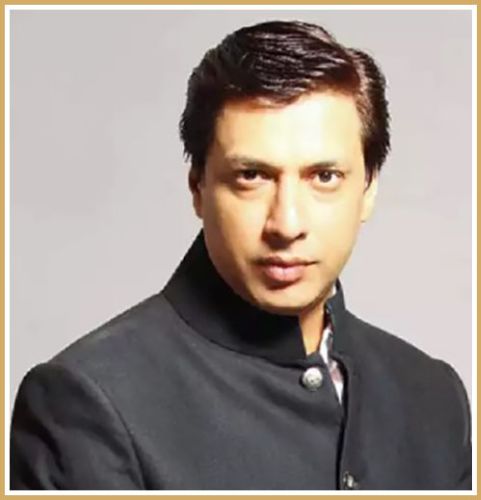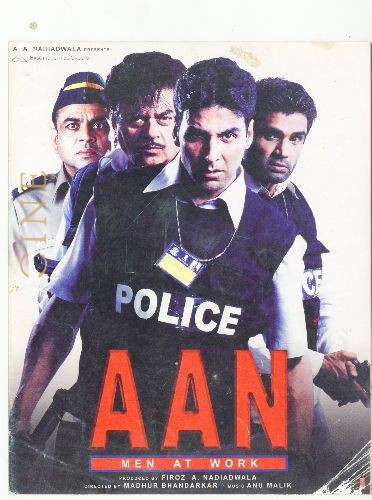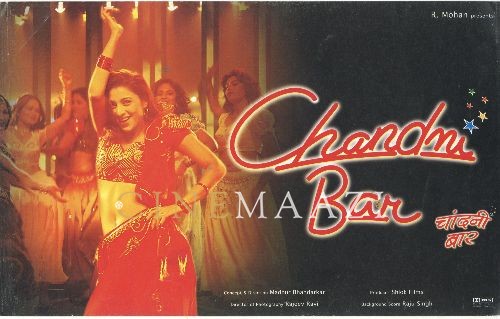Madhur Bhandarkar

Subscribe to read full article
This section is for paid subscribers only. Our subscription is only $37/- for one full year.
You get unlimited access to all paid section and features on the website with this subscription.
Not ready for a full subscription?
You can access this article for $2 , and have it saved to your account for one year.
- Born: 26 August 1968 (Mumbai)
- Primary Cinema: Hindi
- Parents: Shanta Bhandarkar
- Spouse: Renu Namboodiri
- Children: Siddhi (daughter)
Multiple award-winning director, script writer and producer, Madhur Bhandarkar is known for his hard-hitting, gritty and realistic brand of cinema. His directorials such as Chandni Bar (2001), Page 3 (2005), Fashion (2008), Traffic Signal (2007), Corporate (2006) and Jail (2009) have won both critical acclaim and box office success. In an interview he once maintained, “My movies are not exposes, maybe they just hold up a mirror to society. My movies are not judgmental; I just show what happens in our society, sometimes there could be a solution and sometimes there may be none. Life goes on.” He is also known for his strong female protagonists as essayed by Tabu in Chandni Bar, Raveena Tandon in Satta (2003), Konkona Sen Sharma in Page 3, Bipasha Basu in Corporate (2006), Neetu Chandra in Traffic Signal, Priyanka Chopra in Fashion (2008), Kareena Kapoor in Heroine (2012), Kirti Kulhari in Indu Sarkar (2017), and Tamannah Bhatia in Babli Bouncer (2022). He has also depicted gay characters in his films like Page 3, Traffic Signal and Fashion. In 2016, he was honoured with the Padma Shri, the fourth highest civilian honour, by the Government of India. He was also nominated as society member of the Satyajit Ray Film and Television Institute by the information and broadcasting ministry. In 2010, the National Film Archive of India (NFAI) announced its decision to preserve Bhandarkar’s films Chandni Bar, Page 3, Corporate, Traffic Signal, Fashion and Jail.
Born on 26 August 1968 in Mumbai, son of an electrical contractor, he was never very interested in studies. His interest lay in films, though he couldn't usually afford a cinema hall ticket and often got someone to sponsor it. Most of the films he watched were via street shows back in the 1980s, where films would be screened in the lanes of Khar in Mumbai, where he lived. While boys his age picked up Tintin, Archies or Amar Chitra Katha comics, he would devour film magazines, buying them cheap from the raddiwala. This made him a hit among his friends, as he could bring them up to speed with all the gossip! Another favourite pastime of his was observing the faces of people as he travelled in public transport, and trying to guess their lives.
He studied at St Joseph’s but couldn't finish his schooling. Despite not being able to fulfill his wish of becoming a graduate, he fulfilled his love for learning by reading voraciously, especially biographies bought from second-hand bookstalls. The reason for this was that when he was around 12 years old, his father, an electric contractor, suffered heavy losses in business. By the age of 14, he started to work as well. He served as a delivery boy at a video store, dropping off cassettes to customers. He even sold chewing gum at traffic signals. He came closer to his real interest – films, when he worked as assistant to small-time directors for a small salary. He even travelled to Dubai and Muscat where his elder sister lived, looking for work.
Keen to pursue his dream of becoming a director in the Hindi film industry, he got a break assisting Ram Gopal Varma on Rangeela (1995). He even played his first cameo in Rangeela. Post this, people began to take his plans of direction seriously. After years of trying, he finally landed his first directorial, Trishakti (1999). An out and out commercial film, it was launched in 1996 but was three years in the making. In keeping with the producer’s wishes, he incorporated all the so-called must-have elements including a dog, an item girl, a heroine in a bikini, and a helicopter. The film bombed but he remains proud of it for being his debut film. He also believes that it flopping was a blessing in disguise; had it worked, he would have probably been churning out the same content for the rest of his life.
Given a cold shoulder by the industry on account of his failed debut directorial, the picture changed with his next – Chandni Bar in 2001. A crime drama, it depicted the gritty life of the Mumbai underworld, including prostitution, dance bars and gun crime. The plot revolved around a displaced woman who is forced to become a beer-bar dancer, and sire the children of a gangster. Starring Tabu and Atul Kulkarni in lead roles, the film was a critically acclaimed hit. At the 49th National film awards, it won four awards, namely the National film award for best film on other social issues, best actress for Tabu, best supporting actor for Atul Kulkarni and best supporting actress for Ananya Khare. Made on a small budget of approximately Rs 1 crore, it grossed Rs 6 crore at the box office, making it a thumping hit.
His next, Satta (2003) was a political drama which he co-wrote starring Raveena Tandon in the lead role and Atul Kulkarni, Govind Namdev and Sameer Dharmadhikari in supporting roles. The film narrates the story of a persecuted wife of a greedy politician who takes on his role after he lands up in jail because of murder charges. It is considered one of Tandon’s best performances.
The following year, he directed Aan: Men At Work (2004), an action crime drama starring Akshay Kumar, Shatrughan Sinha and Suniel Shetty. It revolved around DCP Patnaik and his team's fight against corrupted politicians and mafia rule Mumbai city. However, their faith in law and order is tested with serious outcomes.
He made a splash again in 2005 with Page 3, a drama film depicting the Page 3 culture and media in the city of Mumbai. It starred Konkona Sen Sharma in the lead role, as it took a look at Mumbai’s socialite party circle through the eyes of a Page 3 journalist. The cast also featured Atul Kulkarni, Sandhya Mridul, Tara Sharma, Anju Mahendru and Boman Irani. The film won three National film awards, including the Golden Lotus award for best film.
Corporate, his drama film of 2006, brought together Bipasha Basu, Kay Kay Menon and Raj Babbar in a tale of two corporate giants competing in order to recklessly maximise their respective profits. A critic from BBC wrote, "a provocative social commentary, with all the elements of good filmmaking keenly in evidence, the portrait painted of the corporate world is deeply disturbing. For all its startling realism the film is intensely watchable". Rediff.com hailed it as "a smart, gripping, honest film,” while a critic from The Times of India recommended it for "its topicality and the novelty of the story.”
Traffic, which he directed in 2007, saw him revealing the truth behind the multimillion dollar begging industry in India. Starring Kunal Kemmu, Neetu Chandra, Konkona Sen Sharma, Upendra Limaye, it won Bhandarkar the National film awards for best director, as well as the National film award for best make-up artist for Anil Moti Ram Palande.
His 2008 directorial Fashion was a romantic drama depicting a small-town girl who finally realises her dream of becoming a famous supermodel. However, she soon finds out that her glamorous new life has a price. Starring Priyanka Chopra, Kangana Ranaut and Mugdha Godse as fashion models, the film followed their careers, even as it explored feminism and female power in Indian fashion. The film was praised for its direction, screenplay, cinematography, soundtrack and performances of the cast, and was a hit at the box office. It also bagged two National film awards – best actress for Priyanka Chopra and best supporting actress for Kangana Ranaut. According to a newspaper review, the film “is not about cliches alone and manages to transcend them with its moving tale of three women who try to maintain their honor, dignity, [and] identity in a cruel world that spills over with grime behind the glamour. The film not only takes you behind the psychedelic ramp, it travels through the dark inner recesses of the three lead characters, laying bare their strengths and weaknesses; their fears and hopes; their dreams and nightmares.”
Jail, which he directed in 2009, was a drama film that depicted a man reviewing his options after being remanded to policy custody, in an overcrowded jail while awaiting trial. Neil Nitin Mukesh essayed the lead role of the character convicted of a crime he didn't commit, and who must learn to survive inside a brutal Indian prison. With this film, Bhandarkar once again managed to create a ‘hard-hitting canvas peopled with characters who manage to both disturb and touch your heart with their stories of distress’. The film also raised important questions regarding the sluggish legal system and called for its complete overhaul.
With Dil Toh Baccha Hai Ji (2011), he veered away from his usual gritty area of interest to craft a comedy about three roommates in search of true love. They each find a girl with whom they fall head over heels in love with. Now they just have to get the women to reciprocate. It starred Ajay Devgn, Emraan Hashmi and Omi Vaidya. The film received an A (Adults only) rating by the Central Board of Film Certification after Bhandarkar refused to cut certain scenes he felt were integral to the film. The film received a positive response upon release.
His Heroine (2012) depicted a female superstar who struggles through the trials and tribulations of being a Hindi film actress. Revolving around the life of a once-successful film actress whose career is on the decline, it featured Kareena Kapoor as the protagonist along with actors Arjun Rampal and Randeep Hooda. It received mixed critical opinions upon release, even though Kapoor's performance was much appreciated and is considered to be one of her best.
In 2015, his Calendar Girls told the tale of five aspiring models, who are selected to appear in a photoshoot for a prestigious calendar and what happens to them later. The film was dubbed fairly engaging in its expose of how far the ruthless metropolis takes the unsuspecting career girls before unceremoniously dumping them.
In 2017, he directed Mumbai Mist, a segment of Where Has the Time Gone? A short film omnibus, it featured the work of five directors representing five countries involved in the 2017 BRICS summit, an annual international relations conference held between Brazil, Russia, India, China and South Africa.
The same year, he directed Indu Sarkar (2017), set during the emergency period between 1975 and 1977 declared by Prime Minister Indira Gandhi. It starred Kirti Kulhari, Tota Roy Chowdhury and Neil Nitin Mukesh. The plot of this period political thriller depicted how, during the emergency, Indu's husband, a government employee, plans to use the situation to his advantage and move ahead in his career. However, Indu's sense of morality sets her on a different path. The film garnered mixed reviews from critics, with one reviewer calling it “a watered-down, bloodless version of the Emergency."
In 2022, he directed the comedy drama Babli Bouncer, a comedy drama revolving around a female bouncer, Babli (Tamannaah Bhatia). It explores the various facets of the profession, which is usually dominated by men. The film directly premiered on OTT platform Disney+ Hotstar.
In 2022, he also directed India Lockdown, an adventure drama surrounding the Indian government’s announcement of a country-wide lockdown for 21 days due to the pandemic. It deals with the repercussions of the COVID-19 lockdown in India and how the people of the country struggled through it. The film showcases four parallel stories – a father-daughter duo stuck in different cities, a sex worker and her troubles, a migrant worker with bare resources, and a pilot. It starred Prateik Babbar, Sai Tamhankar and Shweta Basu Prasad, and was commercially released on ZEE5.
Bhandarkar has been conferred with several awards including the Creative Spirit and Visionary Director's award for 2013-14 - at the House of Commons, London, UK, and the state of Maharashtra’s Raj Kapoor Smriti award for contribution to Indian cinema.
He has also been at the centre of controversies. His Indu Sarkar was criticised by Indian National Congress supporters for allegedly attempting to portray former Prime Minister of India Mrs Indira Gandhi and her son Sanjay Gandhi in a bad light. Bhandarkar clarified that it was not a biopic on former Prime Minister Indira Gandhi under whose regime the emergency was declared in the country in 1975. The Supreme Court refused to stay the release of the film, quoting it as “artistic expression within the parameters of law.”
In 2004, Preeti Jain, a model and actress, accused Bhandarkar of raping her with the promise of casting her in his films. In 2012, the Supreme Court passed an order quashing the criminal proceedings, noting that Jain did not want to pursue the case and that the Mumbai police had earlier called the claim false and thus given him a clean chit.
Bhandarkar married Renu Namboodiri on 15 December 2003 in Mumbai. They have a daughter named Siddhi.
References
https://archive.ph/2013.01.03-125540/http://articles.timesofindia.indiatimes.com/2009-09-27/news-
interviews/28112113_1_local-train-dance-bar-girls-movies
https://starsunfolded.com/madhur-bhandarkar/
https://www.imdb.com/name/nm1055105/
Image credit: https://timesofindia.indiatimes.com/entertainment/hindi/bollywood/photo-features/padmaavat-bollywood-celebs-who-have-supported-the-film/madhur-bhandarkar/photostory/61769207.cms
-
Filmography (2)
SortRole
-

Aan : Man At Work 2004
-

Chandni Bar 2001
-







.jpg)



